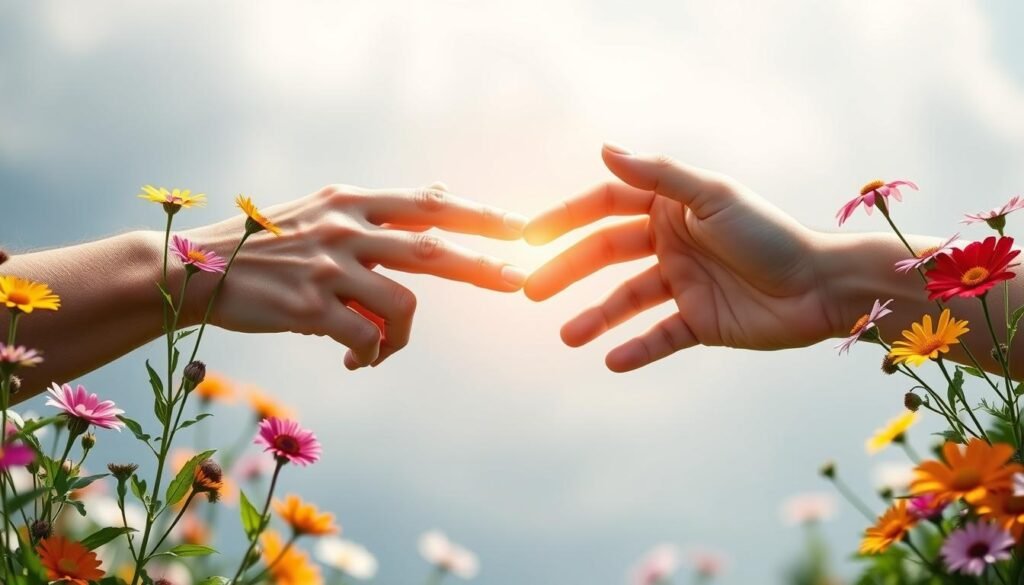Building Healthy Relationships: Nurturing Connections

Have you ever thought about what makes a friendship deep and strong? Building healthy relationships is more than just talking or hanging out. It’s about the emotional, psychological, and social benefits we get from them.
Studies show that strong connections boost our mental health and happiness. They give us a solid base for support and friendship. By looking into how different relationships work, like with friends or family, we can make our social lives better.


Working on these areas can make our relationships stronger and our lives more supportive and happy. Being together through shared activities and support helps us build lasting, positive relationships.
Key Takeaways
- Building healthy relationships is essential for overall well-being.
- Nurturing meaningful connections enhances mental health.
- Understanding different relationships helps strengthen bonds.
- Positive social interactions contribute to emotional resilience.
- Investing time and effort is crucial for relationship growth.
The Importance of Building Healthy Relationships
Building healthy relationships is key to our emotional and social health. These connections offer us support, love, and a sense of belonging. This makes our lives better and happier. Healthy relationships protect us from mental health problems. Studies show that strong social ties are linked to better mental health. People with good relationships are more resilient when life gets tough. Good relationships also help us communicate better. With strong connections, we can share our needs and feelings clearly. This leads to better understanding and fewer conflicts. Our health can also improve with good relationships. A Harvard Health Blog study found a link between social connections and living longer. This shows how important it is to keep building meaningful relationships. By focusing on building healthy relationships, we make our community stronger. We put our emotional health first and strengthen our bonds with others.Nurturing Meaningful Connections
Building strong connections is key to our happiness. It’s important to see how relationships make our lives better. By keeping good relationships, we get a support system. This helps us get through tough times and feel like we belong.Understanding the Value of Connections
Connections give us emotional support and make us feel secure. They are good for our mental health and happiness. By having positive relationships, we grow personally and make our lives richer.Types of Relationships to Nurture
We should focus on a few important relationships:- Friendships: These give us joy and someone to hang out with.
- Romantic partnerships: They give us closeness and feel safe.
- Family ties: These offer support without conditions.
- Professional connections: They help us grow in our careers and meet new people.

Effective Communication Skills for Relationship Building
Good communication skills are key to strong, healthy relationships. We can make our connections better by using techniques that help us understand each other and feel safe. This part talks about important parts of communication like active listening, sharing our feelings and needs clearly, and how nonverbal cues affect us.Active Listening Techniques
Active listening is vital for building relationships. When we really listen to someone, we show we care about what they say. Important ways to listen well include:- Giving full attention and avoiding distractions
- Maintaining eye contact to show engagement
- Providing feedback through verbal acknowledgments and nonverbal gestures
Expressing Feelings and Needs Clearly
Telling others how we feel and what we need helps avoid confusion. Saying “I feel upset when…” instead of “You always make me upset” starts a better conversation. This way, we talk more honestly and improve our communication skills.Nonverbal Communication and Its Impact
Nonverbal cues like gestures, body language, and facial expressions say a lot more than words. They can show we’re comfortable, uncomfortable, or excited. Paying attention to these cues makes our words stronger and our communication better. Here’s how different nonverbal elements affect our talks:| Nonverbal Element | Effect on Communication |
|---|---|
| Eye Contact | Shows confidence and interest |
| Body Language | Shows if we’re open or not |
| Facial Expressions | Shows our feelings well |

Building Strong Social Bonds
Building strong social bonds is key to having positive relationships and feeling good overall. Doing things together and sharing experiences helps us make deep connections. We’ll look at why having common interests and support in relationships matters.Common Interests and Shared Activities
Sharing common interests helps people connect more deeply. Whether it’s a hobby, a sports team, or volunteering, these activities let us bond over what we love. They bring us joy and help us talk and understand each other better, which keeps our connections strong.Being Supportive and Available
Being supportive and there for others is important for strong bonds. When we really care about how others feel and listen to them, it shows we value our relationships. Being emotionally open helps us build positive connections, making our loved ones feel seen and valued.| Aspect | Importance | Example Activities |
|---|---|---|
| Common Interests | Enhances connection and communication | Sports, Hobbies, Volunteering |
| Supportive Presence | Builds trust and emotional safety | Listening, Encouragement, Availability |
Establishing Trust and Rapport
Our relationships are built on trust and rapport. It’s key to build these for strong connections. Being open and honest helps us create bonds based on trust and respect.Transparency and Honesty in Relationships
Being truthful is crucial for lasting bonds. Open communication lets honesty rule. This way, we can clear up any issues, making our emotional ties stronger. It makes people feel important and respected. This builds a sense of belonging.Building Emotional Safety and Security
Feeling safe emotionally is just as important. We need places where we can share our thoughts without fear. When we’re safe, we can be more open, deepening our connections. Putting effort into emotional safety helps build trust. This makes our relationships much stronger.| Key Aspects | Impact on Relationships |
|---|---|
| Transparency | Enhances openness and understanding |
| Honesty | Fosters mutual respect and reliability |
| Emotional Safety | Encourages vulnerability and intimacy |
| Trust | Strengthens emotional bonds and commitment |
Building Healthy Relationships: Nurturing Meaningful Connections
Building strong relationships is key to a happy life. It’s about making habits that help us grow together. Things like regular chats, being open, and saying thanks are important. We should make these habits a part of our everyday life.Developing Healthy Relationship Habits
Building a strong base takes work. Here are some good habits to start:- Have weekly chats to talk about feelings and worries.
- Listen well to show you care and support.
- Show thanks often to each other.
Overcoming Challenges Together
Relationships have ups and downs. Facing problems together can make us closer. It’s about working as a team to get through tough times. Research says couples who work together feel more satisfied. Here’s how to face challenges:- Talk openly about what’s bothering you.
- Find solutions that work for both of you.
- Support each other all the way.
| Healthy Relationship Habit | Benefit | Frequency |
|---|---|---|
| Weekly Check-ins | Strengthens communication | Once a week |
| Active Listening | Enhances understanding | Every interaction |
| Expressions of Gratitude | Builds positivity | Daily |
Conclusion
Building healthy relationships is a journey that makes our lives better and boosts our emotional health. By talking well with each other, we make our connections stronger. This helps us understand and support each other through tough times. Doing things together and making time to connect sets the stage for lasting friendships. Being open and honest builds trust and closeness. These habits help us grow and improve together. This path of building strong relationships makes our lives richer. With hard work and teamwork, we create bonds that help us and our loved ones. Let’s keep moving forward on this path of connection and support. It makes our lives and the lives of those we care about better.FAQ
What are some strategies for building healthy relationships?
Building healthy relationships means improving how we talk to each other. It’s also about building trust and feeling close through regular time together and shared activities.
How can we cultivate strong bonds with others?
To build strong bonds, spend quality time together and do things you both like. Be there for each other and listen well. This makes your connection stronger.
What are the key components of effective communication in relationships?
Good communication is key. It means listening well, sharing your feelings and needs, and knowing how your actions affect others.
Why is establishing trust important in relationships?
Trust is crucial. It makes a safe space for honest talk and deep feelings. This is key for strong, healthy relationships.
How can we maintain healthy interpersonal connections over time?
Keep relationships strong by checking in often and saying thanks. Work together to face challenges. This keeps your bond healthy.
What role does emotional intimacy play in relationships?
Emotional intimacy lets us connect deeply. It means sharing our thoughts and feelings safely. This builds stronger relationships.
How can nurturing positive relationships benefit our overall well-being?
Positive relationships boost our emotional and mental health. They give us support, love, and a sense of belonging. This makes life better.